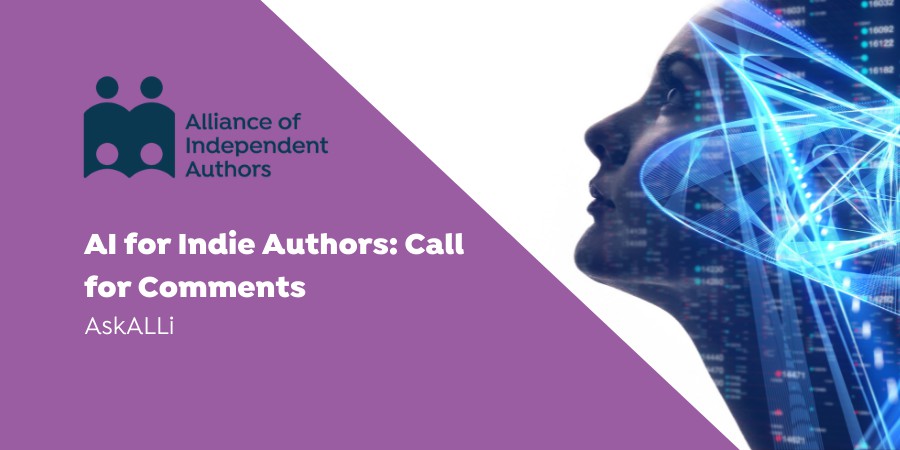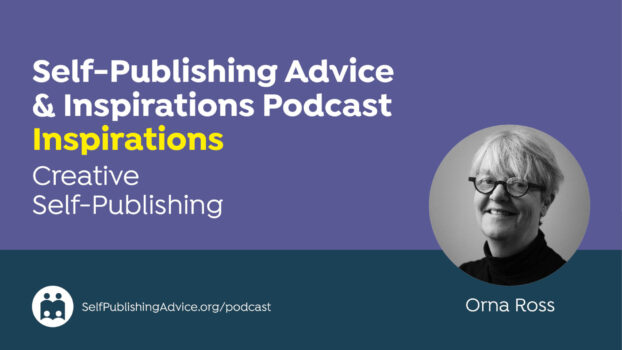Are you concerned about what AI–artificial and augmented intelligence–might mean for writers and publishers? Or excited by its potential? If you're an independent author or self-publishing service, the Alliance of Independent Authors, wants to hear your ideas, insights, thoughts and recommendations through ALLi's Call for Comments on AI in Self-Publishing

Orna Ross, Director of ALLi
As a progressive community that values forward-thinking approaches, ALLi is positive about the potential benefits that generative AI can bring to self-publishing authors and services, but we also acknowledge the many ethical, privacy, and IP concerns that come with AI and other Web3 technologies.
We wish to update our existing guidelines for authors, to ensure our policies accurately represent our community's values and needs, and to provides guidance to our author and partner members.
To that end, we would appreciate your help with ALLi's call for comments on AI in self-publishing and have three questions for you to answer below.
AI in Self-Publishing: Copyright
As AI technology advances, it poses significant questions for copyright law both on input (the data that AI is trained on) and output (the results that AI produces). ALLi has been following with interest as the World Intellectual Property Organization held its first Conversation on IP and AI, bringing together member states and other stakeholders to discuss the impact of Al on IP policy, globally. We made a submission to this body last Feb 2020 and various submissions to governments worldwide, the most recent to the UK government in May 2023. We are also closely following the various legal cases unfolding around the world.
There are three routes that copyright legislators can take when considering creative works generated by an AI system:
Input:
- Existing Copyright Law Application: The current copyright laws could continue to be applied. This would mean that all data used to train the AI system must either be original, in the public domain, or properly licensed for use. This perspective sees AI as a tool in the hands of its human operator.
- Extended Licensing or Exemptions: Legislators might consider creating specific licenses or exemptions for the use of copyrighted material by AI systems. This could involve the expansion of the ‘fair use' or ‘fair dealing' doctrine to include the use of copyrighted works for AI training, acknowledging the transformative nature of such usage.
- Data Commons Approach: A more collaborative route might involve promoting the establishment of data commons or public datasets, which AI developers could freely use for training their systems. This would encourage sharing and collaboration but would also necessitate extensive conversations about data rights and privacy.
Output:
- Human Attribution: All output generated by the AI system could be attributed to the human operator or owner of the AI system, much like a photographer is credited for a photo, not the camera. This approach aligns with the prevalent legal view that copyright can only be granted to human-created works.
- AI as a Creator: AI could be legally defined as the ‘creator' of its outputs. This would require new legal frameworks to account for non-human creation of intellectual property and would raise significant issues around ownership and liability.
- New Category of Copyright: A new category of ‘AI-generated work' could be created with its own set of rules for ownership, licensing, and infringement. This might involve a shorter duration of copyright protection, different rules for infringement, or shared ownership models.
AI in Self-Publishing: Call for Comments
ALLi now wants to update our assessment of the potential impact of AI on how independent authors write, publish, and trade (our last assessment was mid-2021). We seek to do this through an open conversation with members, advisors and other interested parties.
From this assessment, we will update our practical and ethical guidelines for our author and partner members.
We have three questions that we are currently circulating to our members and advisors and below we provide some headings, topics and questions for further consideration.
1. What is your stance on how the data was collected for generative AI models? Is it copyright infringement? Is the use of tools built on that foundation ethically sound for authors?
2. Should we accept the harvesting of data without attribution or consent as a fait accompli now, or should we look for compensation? If the latter, how?
3. What is the best way to encourage the growth of author/creator agency and income in the era of generative AI?
You can leave your response as a comment below, which will allow us to have dialog and debate right here on this page. Or if you'd prefer to make a private submission, you can also send your comments to [email protected] using the subject-line “AI and Indie Authors: Call for Comments”.
We will be preparing an official policy document, so please fact-check your opinions before submission and include as much evidence as possible to support your comments and responses.
We look forward to hearing your thoughts! Closing date for submissions is June 20th 2023.
Different jurisdictions are adopting different solutions. At time of writing, in the EU, MEPs have just endorsed new transparency and risk-management rules for AI systems while in Japan, the country’s Minister for Education, Culture, Sports, Science and Technology, Keiko Nagaoka, indicated that Japan’s copyright laws don’t forbid the use of training AI on copyrighted materials.
Things are changing fast.
 If you want to know more about what AI means for indie authors, we recommend you follow our Enterprise and AI Advisor, Joanna Penn, who is keeping authors up to speed in the AI section of her website and podcast and whose book Artificial Intelligence, Blockchain and Virtual Worlds is a terrific introduction to the topic
If you want to know more about what AI means for indie authors, we recommend you follow our Enterprise and AI Advisor, Joanna Penn, who is keeping authors up to speed in the AI section of her website and podcast and whose book Artificial Intelligence, Blockchain and Virtual Worlds is a terrific introduction to the topic
AI in Self-Publishing: Further Comments and Questions
Copyright
- Should content generated by AI be eligible for protection by copyright or related rights?
- If so, who should benefit from this protection, and how long should it last?
- How do you feel about AI platforms using your books to create AI systems?
- No financial model currently exists for authors and publishers to license copyright works to AI platforms. Would you be in favor of this? How might such a model work? What sort of license might enable an author to benefit from the Natural Language Generation models used to generate new works?
- How will readers know if a book is created by AI or not? Does it matter?
- Is there a need for greater clarity about who is liable when an AI infringes copyright?
- Does copyright already provide adequate protection for software which implements AI? Is new licensing law is necessary to take account of the growing use of AI in publishing or are current copyright legislation sufficient? Is there a need to clarify existing exceptions, to create new ones, or to promote licensing?
- Do we need a data licensing clause in contracts?
- Can governments legislate for this? Do we want them to? What sort of protection do we want from copyright law?
- Do other issues need to be considered? What are they?
Writing
- Do you currently use any AI tools in your writing?
- Can you envisage writing challenges that are solved by AI? Writing processes that are speeded up?
- How do you feel about AI in writing? Are there ethical or practical issues you'd like to raise?
- Do other issues need to be considered? What are they?
Publishing
- Trade publishers are increasingly including a clause in their rights licensing contracts, saying that the contract covers “…all formats existing now and to be invented”. Do we need to resist this?
- Will “human-made” become a selling point in your marketing? What can humans do better than AI? What do humans offer that AI can't?
- How do you feel about AI in publishing and self-publishing?
- Are there other ethical or practical issues you'd like to raise?
- Do other issues need to be considered? What are they?






This is a good initiative to gather multi-dimensional perspectives from the community on this topic. Issues such as copyright, ethics, and privacy related to AI need to be discussed publicly.
I simply wanted to send you a quick note to let you know that I’m very new to blogging and that I genuinely enjoy your page. It is very likely that I will add this post to my bookmarks on your blog. Your articles and testimonials are unquestionably of the highest quality. Thank you for letting me know about your website.
More and more authors, publishers and other creators now use, and want to expand their use, of AI tools to generate text, as working drafts, and completed works.
There are two ways that copyright law can treat works where human interaction is minimal or non-existent. It may deny copyright protection to computer-generated works, or it may assign the authorship of such works to the person who created the program.
should grant new works generated by intelligent algorithms with little or no human intervention
I love these questions, Orna!
You raise a number of important issues. AI, once it’s fully realized as a creative tool for writers, is poised to bring a sea change in the craft — not unlike digital editing tools and digital cameras brought to photography or similar advances brought to creatives in music, architecture, and so many other fields. We get to decide how we react to it, embrace it, and grow with it.
As a creator of an AI creative writing tool (Sudowrite) I’m biased to see the opportunities. But I was a writer before Sudowrite came to be, and the project grew from my interest in understanding and learning to use AI tools in my own writing.
Writing is a challenge for many of us. Some of us love to edit and revise, but are loath to put that first word on paper. Others are the complete opposite. Some get mired in the middle, others tear their hair out landing the ending. My belief is that just as spelling and grammar checking software lifted some of the load off our shoulders, software like Sudowrite can do the same when we’re stuck in a scene, struggling to describe an object or a setting, or just not sure how to inject something fresh into a tired plot line. In the end, I’m still the writer. I bring my experiences, my history, and my taste to the subject matter. And I need to make the choices and do the work that imbues my piece with pathos and meaning.
There’s a lot to figure out here, especially with regard to rights issues. In my opinion, the most important thing is that writers’ work be protected. And as you point out, we need to continue to look for opportunities everywhere.
In a conversation with Joanna, she suggested the idea that multiple authors could license their related works (say, thrillers) to train a model that could then be licensed to others to help them write thrillers of their own. I love this kind of creative thinking, and I think it’s a great example of how we can best react to changes that come with any new technology. It’s not just about how to protect ourselves, but also finding innovative ways to grow and benefit from the changes afoot.
Amit
Orna and Joanna, this is such a great breakdown of the fast-moving changes in the space. Too often, authors come to the subject with the mindset that AI is some scary outside force that’s coming in to displace them. We all know the AI wave is coming — indeed, it’s already here with search, Amazon, Facebook and all the rest — so it’s important to get out in front and make sure we make use of AI to help advance our careers and the self-publishing movement.
When Dr. Matthew Jockers (co-author of “The Bestseller Code”) and a group of authors launched Authors.ai (which recently became an ALLi partner member) some 18 months ago, we made sure to send the signal that everything we built was in the tradition of Grammarly, Pro Writing Aid and other tools that authors and writers use to improve their storytelling. A fair number of authors understandably are skeptical of the notion that AI can help them with their craft, and that’s fine. If it envelops our sector with no accountability, the potential for harm is considerable, and Joanna has masterfully laid out some of the scary scenarios in her podcast (and no doubt in her book, which I just bought!). But the answer is to help steer AI down the right path, not to shut our eyes and hope it goes away. Because if we do that, then the worst use cases will come to pass.
What we’ve found over time is that thousands of authors are now using our artificial intelligence to good effect, as evidenced by the testimonials and emails we receive all the time, not just from authors but from book editors. Others don’t want anything to do with AI, and that’s fine. There are many ways of writing a great novel, and AI has just come onto the scene. So let’s learn from each other and put down those markers to clearly define what crosses the line when it comes to AI and what doesn’t cross any ethical line but instead helps authors with their writing journey.
Great summary.
The copyright issues are complex as authors typically have minimal input and few realistic recourse options available due to the high cost of litigation and fly by night nature of the infringers.
But your suggested approach is sound. The biases on multiple grounds in older works in the English language is a definite issue, which needs to be watched for carefully.
Authors are now competing with algorithms. We need to step up. Becoming creative across multiple disciplines is one option. Our experience with creating NFTs for authors shows that there is a capacity among authors for creating multi media support material for books.
The involvement of indie authors in cover design/selection, book trailers, and multiple other creative outlets is a part of this process of authors also evolving.
The AI engines will have to be good to keep up. And can we please get Amazon to tag AI produced books so we know what we’re up against?
Thanks for opening up the debate, Orna. It’s so important that creatives engage with AI as it is not the future — it really is right now!
Things are changing fast in the AI space and with Microsoft licensing Open AI’s GPT-3, AI tools will rapidly become part of every writer’s process regardless of whether they are aware of it. A Chinese language model 10x bigger than GPT-3 was launched this week and things will only become more complex over time.
Of course, we also use AI tools right now — Google search, Facebook, Amazon algorithms, and more.
In terms of AI in creativity, musicians and visual artists are embracing new tools and in writing, we have an expanding array of options.
https://www.thecreativepenn.com/ai-writing-nlg/
I look forward to hearing people’s thoughts.
An excellent overview befitting ALLi’s members. For the many ALLi fiction writers, perhaps consider reading a more philosophical, humorous implication of AI in the best-selling book and 2019 Booker Prize longlist, Frankissstein by Jeanette Winterson. It won’t help writers face the pragmatic challenges of machine v human writing, but it will satisfy the funny bone.